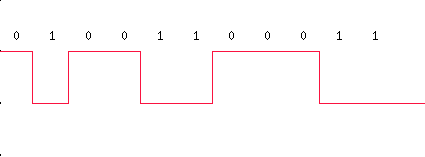
0 <==> high level
1 <==> low level
![]() Require time
coordination "synchronization": As all pulses have equal duration and there is
no seperation between them.
Require time
coordination "synchronization": As all pulses have equal duration and there is
no seperation between them.
![]() Contain non zero
DC component that is difficult to transmit, carries no information.
Contain non zero
DC component that is difficult to transmit, carries no information.
![]()
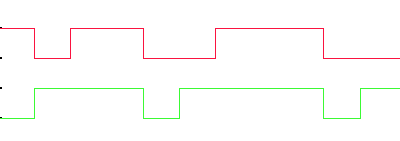
Invert on ones, a transition (low-to-high or high-to-low) at the beginning of bit time denotes a binary 1
for that bit time. No transition indicates binary 0.
![]() Reliable to
detect in presence of noise.
Reliable to
detect in presence of noise.
![]() Not polarity
sensitive.
Not polarity
sensitive.
![]() Needs less power
to transmitt.
Needs less power
to transmitt.
![]() Long string of
0s. (disadvantage)
Long string of
0s. (disadvantage)
![]()
![]() Bipolar-AMI
Bipolar-AMI
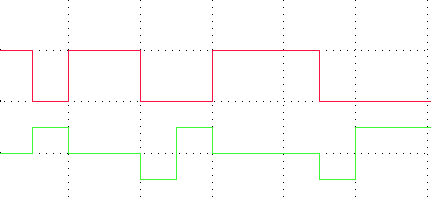
Binary 0 is represented by no line signal and a binary 1 is presented by a positive or nagative pulse.
![]() Pseudoternary
Pseudoternary
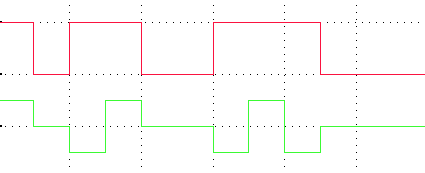
In that case the binary 1 is represented by no line signal and a binary 0 is presented by a positive or nagative pulse.
![]() No DC
component.
No DC
component.
![]() Easy to
synchronize.
Easy to
synchronize.
![]() Easy to detect
one lost pulse.
Easy to detect
one lost pulse.
![]() Long strings of
0s (Bipolar-AMI) or long strings of 1s (pseudoternary).
Long strings of
0s (Bipolar-AMI) or long strings of 1s (pseudoternary).
![]() Needs more power
to transmitt.
Needs more power
to transmitt.
![]()
![]() Manchester
code
Manchester
code
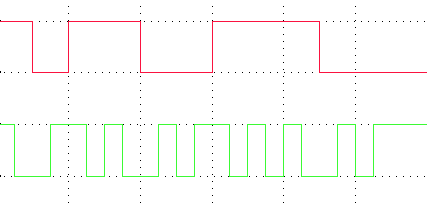
0s reprsent a transition from high to low in middle of pulse interval and 1s represents a transition
from low to high in pulse of intervals.
![]() Differential Manchester
Differential Manchester
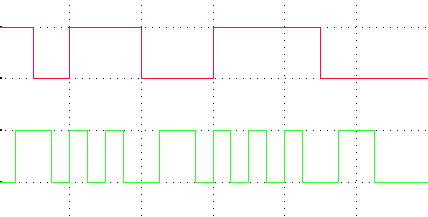
0s represents transition at the beginning of pulse interval while 1s represents absence of transition at the beginning of pulse interval.
![]() Reciever can
synchronize on transitions.
Reciever can
synchronize on transitions.
![]() No DC
component.
No DC
component.
![]() Bandwidth is
wider than the bandwidth for multilevel binary code.
Bandwidth is
wider than the bandwidth for multilevel binary code.
![]()
Widly used in long-distance applications.
![]() B8ZS-
Bipolar with 8-zeros substitution
B8ZS-
Bipolar with 8-zeros substitution
If last pulse before 8 0s is positive, then encode as 000+-0-+
If last pulse before 8 0s is negative, then encode as 000-+0+-
![]() HDB3 high-density bipolar-3 zeros
HDB3 high-density bipolar-3 zeros
Replacing any string of four zeros by three zeros followed by violation that is the same polarity as previous transition.
| No. of 1 since last sub. | No. of 1 since last sub | |
| Polarity of Preceding Pulse |
Odd |
Even |
|
- |
000- |
+00+ |
|
+ |
000+ |
-00- |
![]()
References
Telesystem Winter 97, Period 3
Telesystem coursehttp://www.it.kth.se/htbin/finger?waseem@it.kth.se
Lastest update 970128